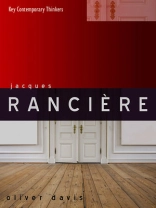This book is a critical introduction to contemporary French philosopher Jacques Rancière. It is the first introduction in any language to cover all of his major work and offers an accessible presentation and searching evaluation of his significant contributions to the fields of politics, pedagogy, history, literature, film theory and aesthetics.
This book traces the emergence of Rancière’s thought over the last forty-five years and situates it in the diverse intellectual contexts in which it intervenes. Beginning with his egalitarian critique of his former teacher Louis Althusser, the book tracks the subsequent elaboration of Rancière’s highly original conception of equality. This approach reveals that a grasp of his early archival and historiographical work is vital for a full understanding both of his later politics and his ongoing investigation of art and aesthetics.
Along the way, this book explains and analyses key terms in Rancière’s very distinctive philosophical lexicon, including the ‘police’ order, ‘disagreement’, ‘political subjectivation’, ‘literarity’, the ‘part which has no part’, the ‘regimes of art’ and ‘the distribution of the sensory’.
This book argues that Rancière’s work sets a new standard in contestatory critique and concludes by reflecting on the philosophical and policy implications of his singular project.
Tabella dei contenuti
Preface vii
Acknowledgements xiii
1 The Early Politics: From Pedagogy to Equality 1
Althusser’s lesson 2
Platonic inequality in Marx, Sartre and Bourdieu 15
Jacotot and radical equality 25
2 History and Historiography 36
Les Révoltes Logiques (1975–81) 36
The Nights of Labor: The Workers’ Dream in Nineteenth-Century France [1981] 52
The Names of History: On the Poetics of Knowledge [1992] 57
Conclusion 72
3 The Mature Politics: From Policing to Democracy 74
Politics and ‘the police’ 76
Rancière’s structural account of democracy: the ‘wrong’ and the miscount 80
Political ‘subjectivation’ 84
The aesthetic dimension of politics: the ‘division’ or ‘distribution’ of ‘the sensory’ (le partage du sensible) 90
Overall assessment of Rancière’s account of politics 92
4 Literature 101
‘What is literature?’ 102
Writing, literarity . . . and literature 107
Rancière as reader 115
5 Art and Aesthetics 126
Aesthetic experience and equality: with Kant and Gauny, against Bourdieu 128
The regimes of art 134
Film and film theory 138
Contemporary art, politics and community 152
Afterword 160
Notes 162
References 191
Index 207
Circa l’autore
Oliver Davis is Associate Professor of French Studies and Programme Director of the Centre for Research in Philosophy, Literature and the Arts at the University of Warwick.












